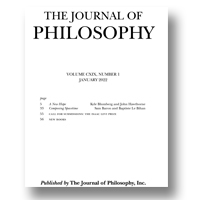|
1.
|
The Journal of Philosophy:
Volume >
120 >
Issue: 11
Ginger Schultheis
Counterfactual Probability
abstract |
view |
rights & permissions
| cited by
Stalnaker’s Thesis about indicative conditionals says, roughly, that the probability one ought to assign to an indicative conditional is equal to the probability that one ought to assign to its consequent conditional on its antecedent. Skyrms’s Thesis about counterfactual conditionals says, roughly, that the probability that one ought to assign to a counterfactual conditional equals one’s rational expectation of the chance, at a relevant past time, of its consequent conditional on its antecedent. In this article, I develop a new uniform theory of conditionals that allows us to derive a tenable version of Skyrms’s Thesis from a tenable version of Stalnaker’s Thesis, together with a chance-deference relating rational credence to beliefs about objective chance.
|
|
|
2.
|
The Journal of Philosophy:
Volume >
120 >
Issue: 11
Christopher Willard-Kyle
The Knowledge Norm for Inquiry
abstract |
view |
rights & permissions
| cited by
A growing number of epistemologists have endorsed the Ignorance Norm for Inquiry. Roughly, this norm says that one should not inquire into a question unless one is ignorant of its answer. I argue that, in addition to ignorance, proper inquiry requires a certain kind of knowledge. Roughly, one should not inquire into a question unless one knows it has a true answer. I call this the Knowledge Norm for Inquiry. Proper inquiry walks a fine line, holding knowledge that there is an answer in the left hand and ignorance of the answer in the right.
|
|





